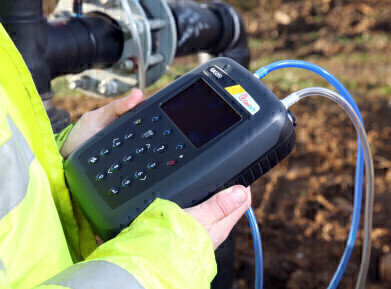Gas Detection
Landfill Gas H2S Increase Measured with High-range Analysers
Mar 01 2012
Hydrogen sulphide levels (H2S) in landfill gas have increased and Geotech (UK) has responded to changes reported by landfill site operators by now offering analysers measuring H2S up to 10,000 ppm. Rapidly rising H2S levels are thought to be caused by waste-to-landfill content changing largely as a result of success in recycling and other initiatives to avoid sending waste to landfill. Previously, H2S was measured at 0-500ppm – still typical for post-scrubber H2S measurement – but higher level monitoring is now essential on many UK landfill sites.
Currently the two main methods of landfill gas measurement are either with portable or fixed-position gas analysers. Geotech reports strong interest in high-range H2S analysis at 0-10,000 ppm which is an option on its newly launched portable landfill analyser, the GA5000 . This option is also available on the Geotech fixed-position, automated landfill and biogas gas analysers, the GA3000 and the Geotech AEMS system.
As well as presenting a significant health risk to operators, H2S can also ‘poison’ the electrochemical cells which provide the most cost-effective solution for H2S monitoring. Higher H2S levels present a greater challenge. The cells must be regularly purged with clean air. Geotech’s portable analysers are easily purged manually after taking each reading and Geotech fixed position gas analysers purge automatically. Without purging, the life of the H2S cell is dramatically reduced and accuracy compromised. Some analyser systems dilute biogas with air in order to monitor H2S continuously but there is a significant danger of adding error with this approach and it may well not be enough to cope with new, high H2S levels.
For the many landfill operators using landfill gas to produce electricity from CHP engines, accurate H2S measurement is essential. To protect CHP engines, inbuilt gas content and quality sensors may cause auto-shut down to protect engines from corrosive H2S damage and CHP engine manufacturers usually specify an upper H2S limit above which warranties can be invalidated. Consequently, landfill operators often prefer to analyse the gas used in CHPs. If the gas is not suitable for CHP use and without an H2S scrubber, likely to cause damage with excessive H2S, they may divert it to flare or use it elsewhere.
High levels of H2S are often reduced with scrubbing systems and gas analysers can measure levels before and after scrubbing. This monitors scrubber performance as well as avoiding high levels of corrosive H2S reaching and damaging CHPs.
Geotech advises that all landfill gas analysers must be used and managed properly, including appropriate purging, to give operators the reliable gas readings essential for gas field management. As H2S levels rise, so does the need for accurate, dependable landfill gas analysis. Geotech works closely with landfill operators and other stakeholders to ensure equipment is in-line with changing conditions as well as being reliable and well-supported.
Digital Edition
IET 34.2 March 2024
April 2024
Gas Detection - Biogas batch fermentation system for laboratory use with automatic gas analysis in real time Water/Wastewater - Upcycling sensors for sustainable nature management - Prist...
View all digital editions
Events
May 20 2024 Columbus, OH, USA
May 21 2024 Lagos, Nigeria
May 23 2024 Beijing, China
May 23 2024 Beijing, China
May 29 2024 Beijing, China


-Medium.jpg)















